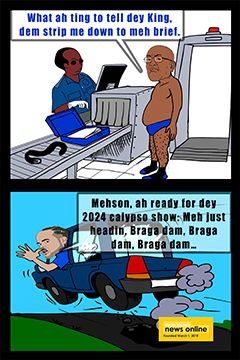Scottish Independence: Much ado about nothing?
The Scottish Independence matter raises serious economic, social, and political questions that are critical to the Virgin Islands.
Scottish independence also feeds into the global economic narrative of stimulus versus austerity. For these Virgin Islands, there are lessons to be learned, despite the fact that the Scots voted not to secede from the United Kingdom on September 18, 2014.
Now, the unpopularity of the British Conservative Party in Scotland, and the even more unpopular Austere Economic Policies of the British Conservatives is one reason for Prime Minister David Cameron’s present political quagmire in Scotland. The dichotomy of the austerity and stimulus economic model was a clear feature of the Scottish Independence debate.
Scotland is a region of the UK where a significant number of residents view austerity as bad for social and economic welfare and development. The Scots are more liberal minded than the English, more left wing so to speak.
The nearly 50% of Scots who appeared to be ready to exit the UK before September 18, 2014, may have had this economic question at the top of their minds. Scotland is more of a bottom or middle up economic model. The British South East possesses a conservative modus Vivendi that is very much a top down or trickle down economic culture.
A key question before the referendum took place on September 18, 2014, was this one: would this unpopularity of the Tory or Conservative Party, a political organization that gets its core support from the English South East, be the straw that broke the camel’s back?
Austerity for British Conservatives appears to be an economic culture, even religion, inherited from when Margaret Thatcher was British Prime Minister. Many an economist will assert that post the Great Recession of 2009, austerity was an economic albatross for Britain, and the rest of Europe.
But the dislike for Austerity, and the British Conservative Party economic model, by a sizeable number of Scots, certainly did not take Scotland into independence, and break a 300 year old union.
Why? Well, there were fears by the majority that independence would not be the El Dorado some preached that it would be.
These were questions, such as independence causing major banks migrate out of Scotland, large international businesses to move their head offices out of the small region, an economic downturn as a result of a yes vote, increasing unemployment as large and small businesses felt the squeeze from Scotland negotiating separation with the rest of the UK, and various financial and banking penalties resulting from independence. These future fears, not yet experienced, placed a cap on the independence idea.
There was talk of Prime Minister David Cameron’s resignation if the Yes Vote prevailed. Cameron would have gone down in history as the Prime Minister who began the breakup of the United Kingdom.
In any event, though Scotland did not break away on September 18, the Scottish independence idea still has political and economic, and social ramifications for the UK going forward. How this will manifest should become clear in the coming months and years.
For these Virgin Islands, the main question is this one: how will the Scottish Independence matter affect the UK relationship with the Oversea Territories. And how is the Scottish independence model relevant to tiny jurisdictions thousands of miles away from the British mainland.
OK. On September 13, 2014, Stephen Erlangersept writing in the New York Times, a story titled, “The Economics of Scotland’s Choice,’’ determined that a vote for Scottish independence would, ‘’CREATE HUGE WAVES.’’
Scottish Independence would shake the government of British Prime Minister David Cameron. Independence would undermine the electoral future of the British Labour Party, and would raise questions about currency and finance for Scotland that could send the small region into the economic doldrums. In short independence would have had seismic political and economic consequences.
Add to these matters the question whether Britain would have stayed in the European Union after a yes vote by Scotland, and whether a nuclear unfriendly Scotland would have allowed Britain base its nuclear submarine fleet in the newly independent country.
An interesting opinion on the issue was given by Istvan Hegedus, Chairman of the Hungarian Europe Society on September 10, 2014 in the Carnegie Foundation Europe Blog. Hegedus stated that, "the emergence of a new sovereign entity in Europe and the shrinking of the UK into LITTLE BRITAIN would send a symbolic message to European Union member states.’’ That, “localism can win over a fragile, quasi federal political structure in the world’s oldest democracy.” In other words it could tilt Europe away from its quasi federal present back into nationalism, and a continent of aggressively competing states.
Another European, Stephen Szabo, Director of the Transatlantic Academy, determined that there would be implications for the Scottish economy, not all good. Szabo further stated that independence would, “weaken what would be left of the UK.’’ Szabo saw independence for Scotland as bad news for the European Union and the North Atlantic Treaty Organization NATO.
Szabo also believed that similar demands for independence could be made by Wales and Northern Ireland, relatively autonomous regions of the UK. In short a breakup of the UK could be conceivable.
Brian Fink is a bookseller and publisher’s agent. His assessment of the Scottish Independence matter read like this: there are cataclysmic ramifications with this issue. Why? Because “the UK is a nuclear power, a leading world economy, and one of the 5 permanent members of the United Nations Security Council.’’ A shrinking of the UKs demographic and political economy would have had a cause and effect that cannot be fully comprehended if independence had become reality.
In any event Scotland voted to remain in the Union on September 18, 2014, so the issues highlighted in this story are simply academic, for the time being.
To be continued
Connect with Dickson Igwe on FACEBOOK and Twitter










.png)

.png)



.png)






















3 Responses to “Scottish Independence: Much ado about nothing?”